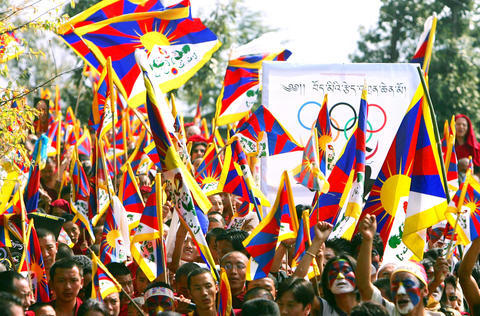The Dalai Lama attacked China's human rights record yesterday, accusing it of "unimaginable and gross violations" in his Himalayan homeland.
"Repression continues to increase with numerous, unimaginable and gross violations of human rights, denial of religious freedom and politicization of religious issues," he told hundreds of flag-waving supporters on the 49th anniversary of his escape to India after an abortive uprising in Lhasa.
The Nobel Peace Prize winner's angry comments came in a speech in the Indian town of Dharamsala and contrasted sharply with what his critics say has been a "soft" approach on China.

PHOTO: AFP
"For nearly six decades Tibetans have had to live in a state of constant fear under Chinese repression," he said.
"All these take place as a result of the Chinese government's lack of respect of the Tibetan people," the 72-year-old told the gathering from his palace in this seat of the Tibetan government-in-exile.
He also complained that Tibet's language, customs and traditions were "gradually fading away" as Tibetans become "an insignificant minority" in their homeland.
Tibetans "have had to live in a state of constant fear, intimidation and suspicion under Chinese repression," he said.
The Dalai Lama, however, said that he would not abandon his call for autonomy in Tibet even though six rounds of talks with the Chinese since 2002 have yielded little result.
"During the past few years, Tibet has witnessed increased repression and brutality. In spite of these unfortunate developments my stand and determination to pursue the `Middle-Way' policy remain unchanged," he said.
He also said August's Beijing Olympics could be a golden opportunity for the international community to expose China over its treatment of Tibetans.
"Besides sending their athletes, the international community should remind the Chinese government of these issues ... China should prove herself a good host by providing these freedoms," he said.
Yesterday also marked the start of a symbolic march home by 100 Tibetans as part of protests ahead of the Beijing Olympics. Several thousand Tibetans, Indians and Westerners waved yellow, blue and red Tibetan flags and cheered on the Buddhist monks in red caps and 10 women who said they planned to make it over the Chinese border.
Italian parliamentarian Sergio D'Elia flagged off the symbolic home trek: "It's the duty of every freedom-loving person to support this march.
The organizers refused to reveal where any attempt would be made to cross the border but said it could take up to six months to reach the Tibetan capital Lhasa.
Tibetan refugees across the world also protested yesterday.
In Nepal, many people were hurt when police used batons to break up a march by about 1,000 Tibetans on the Chinese embassy.
In Greece, a dozen Tibetans activists held a torch-lighting ceremony in Ancient Olympia. Police prevented the Tibetan group, Team Tibet, from entering the Ancient Olympia stadium, and the ceremony took place outside the gates of the site's museum. The group aims to have its Tibetan Freedom Torch Relay pass through 50 cities and end inside Tibet on Aug. 8.
Greek police stopped Tibetan shot-putter Tsultim Golpe as she began her run and took her torch, handing it back later with the flame extinguished. They then escorted the group back to their hotels in Olympia. Officials from China's Athens embassy were in Olympia, filming the ceremony.

The paramount chief of a volcanic island in Vanuatu yesterday said that he was “very impressed” by a UN court’s declaration that countries must tackle climate change. Vanuatu spearheaded the legal case at the International Court of Justice in The Hague, Netherlands, which on Wednesday ruled that countries have a duty to protect against the threat of a warming planet. “I’m very impressed,” George Bumseng, the top chief of the Pacific archipelago’s island of Ambrym, told reporters in the capital, Port Vila. “We have been waiting for this decision for a long time because we have been victims of this climate change for

MASSIVE LOSS: If the next recall votes also fail, it would signal that the administration of President William Lai would continue to face strong resistance within the legislature The results of recall votes yesterday dealt a blow to the Democratic Progressive Party’s (DPP) efforts to overturn the opposition-controlled legislature, as all 24 Chinese Nationalist Party (KMT) lawmakers survived the recall bids. Backed by President William Lai’s (賴清德) DPP, civic groups led the recall drive, seeking to remove 31 out of 39 KMT lawmakers from the 113-seat legislature, in which the KMT and the Taiwan People’s Party (TPP) together hold a majority with 62 seats, while the DPP holds 51 seats. The scale of the recall elections was unprecedented, with another seven KMT lawmakers facing similar votes on Aug. 23. For a

Taiwan must invest in artificial intelligence (AI) and robotics to keep abreast of the next technological leap toward automation, Vice President Hsiao Bi-khim (蕭美琴) said at the luanch ceremony of Taiwan AI and Robots Alliance yesterday. The world is on the cusp of a new industrial revolution centered on AI and robotics, which would likely lead to a thorough transformation of human society, she told an event marking the establishment of a national AI and robotics alliance in Taipei. The arrival of the next industrial revolution could be a matter of years, she said. The pace of automation in the global economy can

All 24 lawmakers of the main opposition Chinese Nationalists Party (KMT) on Saturday survived historical nationwide recall elections, ensuring that the KMT along with Taiwan People’s Party (TPP) lawmakers will maintain opposition control of the legislature. Recall votes against all 24 KMT lawmakers as well as Hsinchu Mayor Ann Kao (高虹安) and KMT legislative caucus whip Fu Kun-chi (傅崐萁) failed to pass, according to Central Election Commission (CEC) figures. In only six of the 24 recall votes did the ballots cast in favor of the recall even meet the threshold of 25 percent of eligible voters needed for the recall to pass,